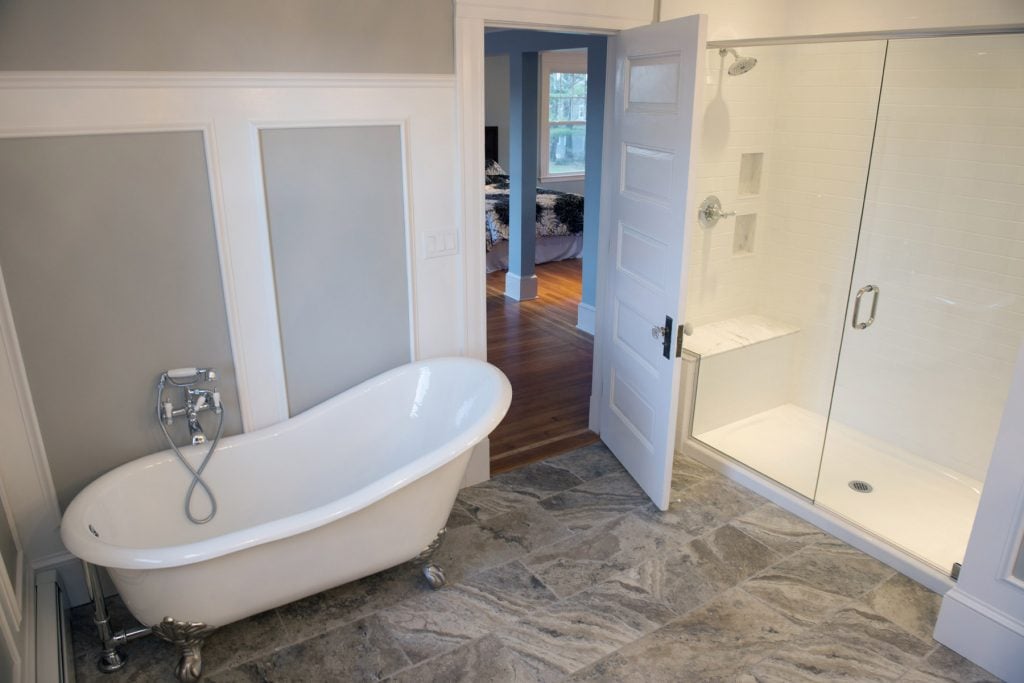
Whether due to a lifelong issue, a sudden injury, or the gradual effects of aging, restricted mobility can influence many aspects of everyday life. Actions that come easy to other individuals can present challenges to those with restricted mobility. Individuals with limited mobility may find that professional disability renovations to their home can make it easier to complete basic tasks. This, in turn, can improve their overall quality of life.
Home Adaptations for Seniors
With advancing age, many senior citizens find themselves unable to get around the house with the same ease as in decades past. Especially in older homes, the floor plan may not facilitate easy movement with a wheelchair or walker. In other cases, bedrooms on upper stories may require walking up and down stairs. Just a few steps at the front door can seriously hinder a wheelchair-bound individual’s ability to move around freely. Disability accomodations, such as widening doorways or adding wheelchair ramps, are often the best way for seniors to continue living in their home.
Home Adaptations for Individuals with Disabilities
Just as seniors often benefit from home modification, many individuals with disabilities choose to remodel their homes for greater ease and access. In the case of older homes, these changes are often obligatory. While seniors might weigh the option of home improvement against moving into an assisted living facility or downsizing to a smaller place, disabled individuals of all ages may wish to purchase an older house. The costs to remodel such a home may prove more reasonable for an individual who intends to remain in the home for many years to come.
Ready to start your disability remodel?
Find ProsTemporary and Permanent Changes
Just as senior citizens and individuals with disabilities may have different remodeling needs, the particular types of home modifications may vary widely. At one end of the spectrum, simple measures can be taken to enhance easy mobility. For example, if you are temporarily restricted to a wheelchair while recovering from an injury, you may simply install an aluminum ramp over the front steps to your door. Other simple fixes include installing automatic controls for lighting or garage doors. More permanent changes may include moving the height of electrical switches and kitchen counters, widening door frames, and installing grab bars in bathrooms.
Grants and Funding
Many of the home modifications necessary for individuals with limited mobility are costly. Therefore, various federal and state organizations and private non-profit charities offer grants to subsidize remodeling costs. If you are a senior citizen, your city or state housing department may have programs to help defray the remodeling costs. Likewise, if you are an individual with limited mobility due to a disability, it’s worth consulting with the Department of Disabilities in your state as well as the U.S. Department of Labor’s Office of Disability Employment Policy. While the office primarily focuses on labor issues related to disability, it also maintains an online clearinghouse of resources related to all aspects of living with disability, including grants. Finally, U.S. veterans are eligible for financial assistance through the U.S. Department of Veterans Affairs. The particular grants available may cover home modifications as well as loans to purchase a home.
Qualifying for a Grant
The specific grant qualification criteria vary among individual aid programs. In essence, you will need to demonstrate that your condition is a legitimate ground for requiring the home modification. In many cases, your modifications plans need to be approved as purely serving necessary, functional ends. Therefore, any remodeling projects you may wish to do for aesthetic reasons should be undertaken separately, to avoid jeopardizing your qualification for grant money. In most cases, you will also need to demonstrate that a fully qualified and licensed contractor has made all modifications. While many homeowners may choose to hire amateur “handymen” to complete small home repair work, bear in mind that many organizations offer grants to cover your expenses may have strict requirements about who you may hire.
Ready to start your disability remodel?
Find Pros- Home Modification Fact Sheet (PDF)
- Home Repairs and Modifications: Assistance for Certain Demographic Groups
- AARP Housing Grants
- Eldercare: Home Modifications
- Home Repair for the Elderly Program
- Maine Housing Home Repair Program
- Southwest Indian Relief Council
- Home Improvements Help Seniors Age in and with Communities
- Philadelphia Office of Housing and Community Development: Links
- Granite State Independent Living: Home Access Modification
- Maryland DOD: Home Modifications
- Housing Grants for Disabled Veterans
- Disability.gov: Help Paying for Home Modifications
- Massachusetts: Various Funding Sources for Home Modifications
- Council for Disability Rights: Home Modification Funding Sources
- Senior Veterans Service Alliance: Home Modification Programs
- Veteran Loans: Home Improvement Loans
- Home Modifications: Helping You Get Around Your House More Easily
 Home Services to Help Aging in Place
Home Services to Help Aging in Place  Retiring in Your Own Home: How Baby Boomers Can Age In Place
Retiring in Your Own Home: How Baby Boomers Can Age In Place  Aging in Place With a Little Help from Roommates, Neighbors and Teenagers
Aging in Place With a Little Help from Roommates, Neighbors and Teenagers  Preparing Your Business for the Aging-in-Place Boom
Preparing Your Business for the Aging-in-Place Boom  Remodeling With Seniors in Mind
Remodeling With Seniors in Mind 

I need help,my roof is bad,my bathroom floor is bad and needs replaced,plus the trim and need a walk in shower for my disabled daughter and a small ramp entering our home.we don’t have much money and where hoping for kindness from someone tht just cares.also my floor is making noise when stepped on in one area.toilet r all rusted inside tank and one toilet has rust around it.neex some grab bars put in and so fourth.
I need some help getting a walk in shower for my DISABLE daughter. Also her room widen for her wheelchair.
Anyone know where I can find grants for building an apartment above our home for our adult son with disabilities?